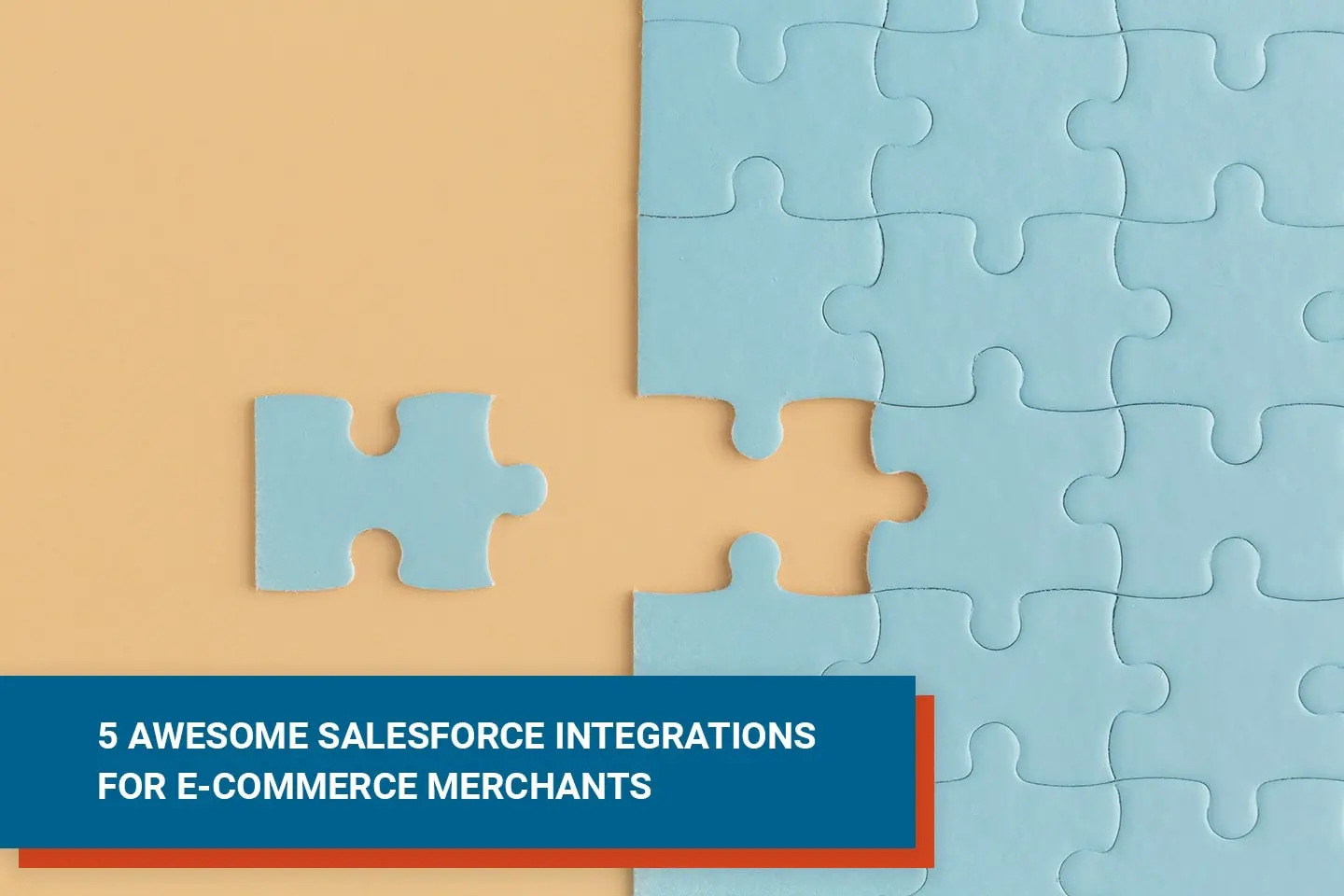Magento CRM and Salesforce Integration Explained
 Igor Krasnykh
·
7 minute read
Igor Krasnykh
·
7 minute read

An Introduction to Integrations
More than ever, businesses are seizing the opportunity to become part of the ecommerce space. Here’s why:
- In 2020, worldwide retail ecommerce sales grew 27.6%, (eMarketer);
- In 2021, e-commerce retail sales reached $4.9 trillion worldwide. (Statista);
- By 2025, e-commerce retail sales are expected to reach $7.4 trillion. (Statista).
The chance to cast a wider customer net coupled with the decreased need for a storefront are two of the biggest reasons the ecommerce industry continues to flourish. Nonprofits have also realized the benefits of shopping carts, which allow them to conveniently accept donations online. An ecommerce platform and Customer Relationship Management (CRM) platform are two of the must-haves for serious ecommerce ventures. The only problem? Most of these systems have no native way to talk to each other. That means they can’t share data like customer information and shipping details. And that equates to hours upon hours of manually exporting information from one platform to another. It’s true — without a way to import data from a CRM to an ecommerce system (and vice versa), a person has to copy and paste details between platforms the old-fashioned way. What a cumbersome task! It also creates a digital environment where data consistency is compromised.
Here’s the scary part. Without a Magento to Salesforce integration, business owners are plagued with wasted company time and a high probability for human error. Data inconsistencies can cause a real problem for businesses. That’s when files and information surrounding a particular customer or product is mis-matched and/or scattered across multiple tables and platforms.
Basic Magento and Salesforce Features
If you’ve never had Magento 2 Salesforce integration explained to you, it may be difficult to imagine how it works. To fully grasp the idea, one must understand the function of each platform.
An eCommerce platform like Magento equips store owners with all the features necessary to do business as a web merchant.
A CRM platform such as Salesforce Sales Cloud serves as a centralized location where customer data is stored. It’s a hub for sales teams to record details about customer interactions, purchases and more. CRMs offer a way to store this important data and turn it into actionable insights. At the end of the day, CRMs help improve business relationships, increase customer retention and drive sales growth.
The CRM is also able to track and collect data from promotion campaigns and marketing efforts (such as a website, social media channels and email). Through this process, messaging can be personalized to meet the specific needs of each person.
Magento and Salesforce are global eCommerce leaders that have become a vital part of many businesses. That is why a need exists for Magento and Salesforce CRM integration.
Salesforce integration with Magento can save businesses a ton of time by automatically syncing:
- Customer Data. Customer details — like name, address and contact information — are automatically synced between the two systems;
- Payment details. Syncing payment information can be especially useful. When dealing with credit and debit cards, typing one number wrong can cause a time-consuming nightmare;
- Order Data. In addition to keeping addresses consistent between Magento and Salesforce, TechNWeb’s extension tracks product inventory, invoices, shipments and tracking numbers.
To put it in perspective, let’s consider the case of Universal Medical Inc. During a six-year time period of integrating its Magento eCommerce platform to its Salesforce CRM, the company synced almost 80,000 customers, 30,000 products and 130,000 orders without skipping a beat. Now, imagine if a person had to manually copy all of this information from Magento to Salesforce. How long would it take?

What Integrates Magento 2 Salesforce?
By this point, you may be wondering how to find the best Salesforce and Magento 2 integration you can get your hands on. There are many integration options on the market that claim to effectively sync data between Magento and Salesforce. Likewise, there are many developers who claim to understand the intricacies of each system. Just ask our customer, Douglas MacGregor of Relyco. As the VP of operations, he said his company wasted six months and $800 on a bogus custom solution before finding TechNWeb. In fact, time and time again, TechNWeb has been praised for its expert-level knowledge of both Magento and Salesforce. “Over the years, [TechNWeb has provided] a continuous supply of subject matter experts, not only from the Magento side, but also from the Salesforce side,” said Katherine Dean, Director of Information Technology at FirstBook. At TechNWeb, expertise is a given. But our Magento 2 Salesforce integration module also boasts several unparalleled attributes. Yes — it enables you to automatically synchronize the Magento catalog and order records with Salesforce and capture business-critical customer data without having to rely on a human being and manual data entry. But it also offers the following:
- Lead Capture. The ability to capture and nurture prospects as they engage with your store and digital content;
- Global Enterprise Compatibility. Multi-currency and Multi-store capabilities;
- Data Normalization. Prevents data duplication;
- Reactivate Abandoned Carts. Capture abandoned carts and non-paid orders as Opportunities in Salesforce;
- Account Management. Ability to see all orders placed by a customer;
- Fulfillment Capabilities. Track product inventory, invoices, shipments and tracking numbers;
- Customer Synchronization.Customer records mirrored between systems;
- Bulk Synchronization. Records synced instantly with enterprise-grade accuracy;
- Powerful, Flexible Mappings. Bi-directional controls for systems of record.
All of these fantastic features give your Magento Salesforce integration meaning that stretches far beyond mere data syncing. TechNWeb’s integration provides the insights you need to nurture leads, acquire new customers and enhance business performance.
It’s obvious that TechNWeb didn’t cut any corners when developing this integration, but don’t take our word for it.
Shawn Abramson, the lead Magento technical architect at MRM Commerce, said, “TechNWeb's Magento Salesforce extension is coded to best practices, works well and it was designed intelligently.”
In addition to offering a robust Magento Salesforce integration, something that really sets TechNWeb apart is its customer service. Top-notch support is something that is mentioned in just about every TechNWeb customer satisfaction survey. It’s no wonder that TechNWeb is a highly recommended Salesforce and Magento integration.
Additionally, TechNWeb is continually rolling out updates and making improvements to its products based on customer feedback.
From a Real Customer
Like many business executives, the leaders at Protect Your Boundaries are big fans of the Salesforce CRM. Because they operate their business on the Magento eCommerce platform, they were looking for a way to sync data between the two systems.
After considering the time it would take to develop an in-house solution, the business decided TechNWeb's Magento-Salesforce integration made the most sense. Watch the video to learn more about how TechNWeb saves the company time while helping to generate more sales.
Watch the video below to hear about their experience using the Magento Salesforce integration from TechNWeb.
How to Integrate Salesforce with Magento 2 Using TechNWeb
Do you feel intimidated by the thought of introducing a new integration into your tech stack? While it may seem complicated on the surface, TechNWeb provides detailed instructions for implementing its Magento-Salesforce integration. Here’s a step-by-step guide for how to integrate the Salesforce CRM with your Magento 2 store.
Installation and Setup
The TechNWeb integration consists of Magento extensions, and Salesforce managed packages that need to be deployed into the client’s environments. This is a direct connection, reducing any data security risks.
After the client makes their purchase, they are contacted by a member of the TechNWeb team to determine how they use Salesforce and discuss the business processes involved.
TechNWeb works with the client to coordinate the installation and configure the integration based on the requirements. The integration can be set up to push data bidirectionally – from Magento to Salesforce, as well as from Salesforce to Magento.
Catalog Synchronization
TechNWeb is the only enterprise-level solution on the market that synchronizes catalogs of more than a million products with a breeze.
Products are matched based on the Magento Stock Keeping Unit (SKU) and Salesforce product code to prevent duplication. The integration supports multi-catalog Magento implementation, synchronization of native and custom data and system of record controls at the field level.
Customer Management
The TechNWeb integration leverages Salesforce leads, contacts, accounts and person accounts, which covers all use cases in B2B and B2C industries. Magento customers are typically matched based on the email address, but custom lookups are offered as well. The integration is smart enough to identify duplicates in Salesforce and resolve any issues automatically.
Opportunities and Abandoned Carts
As a registered customer adds products into his or her shopping cart and begins the process of checking out, the Magento-Salesforce integration captures the cart as an Opportunity in Salesforce. If the checkout process is never completed, the cart becomes abandoned and the Opportunity label gives sales teams a chance to capture consumer data and convert while the lead is hot.
Orders
As orders are placed in Magento, they get captured as Orders in Salesforce and linked to the Opportunities they originated from. The Order will contain products, billing and shipping addresses and notes. As the status of the order changes, it is reflected in the other system.
Invoices and Shipments
Another option the TechNWeb integration provides is synchronizing invoices and shipments. The Magento order may have several invoices and shipments, which will be captured in Salesforce individually. Each shipment may consist of multiple boxes with different tracking numbers. All of that information gets reflected with the TechNWeb extension.
Consider TechNWeb Your Trusted Partner
The Salesforce with Magento integration makes sense for growing businesses. Magento is owned by tech giant Adobe, and the platform moved into its second phase (Magento 2) in 2015. With expanded products and features in the second version, the platform continues to grow as more customers seek Salesforce with Magento integration.
Because the TechNWeb Magento Salesforce integration is feature-rich, flexible and customizable, many eCommerce businesses have found it to be a convenient and refreshing integration solution between the Magento 2-Salesforce power couple.
“With TechNWeb, [Salesforce] is more holistic and offers a more complete and up-to-date picture of all our customers, their purchasing behaviors, product preferences, etc. This data forms the foundation of a strong brand that can deliver a top quality customer experience informed by data.” - said Stuart Keily, Mr. Keily is the director of technology and marketing at Matouk, which uses TechNWeb’s Salesforce Magento integration.
For those looking for a trusted solution to integrate their Magento 2 store with Salesforce, the team at TechNWeb is always available to explain its process and answer questions. If you have a tech team completing the installation for you, watch the video below to see why they’ll love working with TechNWeb!
Still have questions or concerns if we are the right fit? Lets jump on a call to address any open questions or for you to see a short demo of how our solution can help you automate your business processes.
FAQ
How does Magento integrate with Salesforce?
When two platforms have no native way of talking to each other, developers create integrations to fill the gap. These tools are engineered to centralize data, ensure accuracy and eliminate platform-hopping. By using Magento integration to Salesforce, the platforms are able to share and sync data.
How do I integrate Salesforce CRM with Magento 2 Store?
TechNWeb created an extension that seamlessly integrates Magento Salesforce together. Our Magento 2 Salesforce integration module has been praised by merchants across many industries.
Where can I purchase TechNWeb’s Magento-Salesforce extension?
It’s available on our website, as well as in the Salesforce App Exchange and Magento Marketplace. How much does TechNWeb’s Magento integration with Salesforce cost? Fill out the form and tell us how we can best assist you.
What level of customer service can I expect as a TechNWeb customer?
Every merchant has different needs, which is why we offer a tiered pricing structure for customer service. Enterprise-level businesses will have a higher demand for customer support, so we work closely with each customer to determine which level is best for them.
What other products do you recommend?
If you’re a subscription merchant (or are considering becoming one), learn about TechNWeb’s Magento subscription products.



